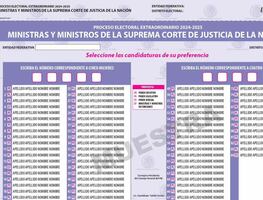Más Información

Anuncian cierre de oficinas de EU en México por funeral del expresidente Jimmy Carter; citas serán reprogramadas

Las noticias nacionales más consultadas de EL UNIVERSAL en 2024; Sheinbaum, “El Mayo” Zambada y Mpox

Alito Moreno urge a cambiar estrategia contra delincuencia; pide poner fin a tragedia de homicidios en gobiernos de Morena

SRE lamenta muerte de ministro Abel Escartín Molina; se desempeñaba en Embajada de México en Reino Unido
The train that is set to enter the Biosphere Reserve of Calakmul as part of the Mayan Train project is considered to be one-of-a-kind and the most ecological in the world.
The soon-to-be director of the National Fund for Tourism Development (FONATUR), Rogelio Jiménez Pons , informed that the train was presented at the International Railways Fair in Berlin, Germany .
Alstom
, the company responsible for its development, is of French origin and specializes in the construction of trains and sea ships. On September 2016 , they presented their train that produced zero emissions, powered by hydrogen batteries.
The Coradia iLint model , as it is known, was developed through an agreement signed in 2014 between the French firm and German authorities to create a clean transport solution.

The train is equipped with cells that turn hydrogen and oxygen into electrical power
while emitting only water vapor instead of smoke. It reaches speeds of up to 140 km an hour .
The unit, which was launched on September 16 of the present year, currently runs through the villages of Cuxhaven, Bremerhaven, Bremervoerde, and Buxtehude, in Lower Saxony . It is the first of 14 units that Alstom will deliver to the German entity to substitute diesel trains before 2021 .
How does it work?
“It uses the hydrogen found in the environment instead of diesel or bio-diesel; it does not release carbon dioxide but water vapor and makes no noise , which is why it will not affect the fauna of this protected natural area,” claimed Pablo Careaga Córdova, founder and general director of Pachamama Travels.
Careaga Córdova is part of Rogelio Jiménez Pons’ team, and is in charge of the Mayan Train project in the Tulum-Chetumal stretch
.
“The hydrogen train is the most ecological in the world, with hydrogen cells that are the most environment-friendly fuel sources we know of. They take the hydrogen found in the air –the most abundant element in nature- and turn it into fuel or energy. Through the combustion process, instead of releasing CO2, as is the case with fossil fuels, the machine only releases water vapor,” he explained.
“It is 100% clean . The only thing that poses a challenge is that hydrogen production is expensive, and it requires machines that consume plenty of power and don’t come cheap,” he explained.
The introduction of this modern train, which will be independent of the one passing through the Yucatán Peninsula and part of southeast Mexico, is currently being analyzed by a scientific council that serves as adviser to the general project of the Mayan Train.
The council is made up of specialists from UNAM, IPN, the Autonomous University of Yucatán, and the Center for Research and Advanced Studies of Yucatán , among other institutions.
Should the option of purchasing the hydrogen train be ruled out, the incoming government would opt for a light train, either electrical or magnetic, so that it does not make noise and doesn’t jeopardize the nature reserve, stated Careaga Córdova.
dm







